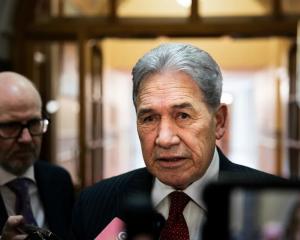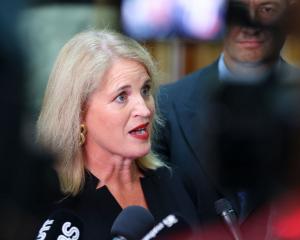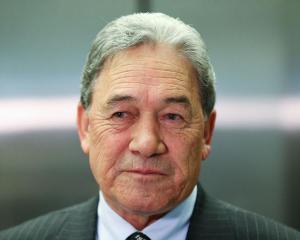Let those oracles of politics - the opinion polls - speak their mind and put the confused inhabitants of Parliament Buildings out of their misery by answering the only question which matters: has the political landscape really changed during the shift in time from BC (Before Cunliffe) to AD (After David)?
John Key and National have been the dominating features of that tableau for so long that no-one has quite adjusted to the notion that the current Government's days might be numbered.
That possibility flowed from last month's Herald-DigiPoll survey which had Labour gaining nearly seven percentage points to register backing of more than 37% of decided voters in the wake of Mr Cunliffe's election as party leader.
National, in contrast, lost five points and slumped to just under 44%. With the Greens hovering around 10% to 11%, a centre-left government has suddenly come into prospect.
One poll does not make a trend. And the Herald-DigiPoll flattered Labour earlier this year only to deceive in a subsequent survey.
However, the results of the latest poll are understood to have been replicated in Labour' s private polling. National's pollsters apparently also recorded a marked drop in support for the governing party around the same time as the Herald-DigiPoll. However, the numbers are said to have since bounced back in National's favour.
It will take a major public poll to either confirm it is business as usual or that things really are on the change.
What is different with respect to current political atmospherics is that the phony war between the two major parties which resulted from Mr Cunliffe's election coinciding with an extended bout of official overseas travel by the prime minister is well and truly over.
To show he is still boss, Mr Key rode into town this week with guns blazing.
For the first time outside the parliamentary chamber, he had Mr Cunliffe in his sights. The prime minister claimed he had information that Labour's No 1 had privately told SkyCity's management that although Labour's official line was that the pokies-for-convention deal was shonky, Labour would not accede to the wishes of the Greens and rip up SkyCity's contract with the Crown.
Facing his first real test as leader, Mr Cunliffe vigorously denied the charge before fudging to such an extent that confused reporters drew different conclusions as to where Labour stands on the matter.
This is not a tactic that Mr Cunliffe can resort to using too often.
Mr Key will keep up the pressure. On the one hand, there are those in Labour who would seek to nobble SkyCity as a matter of principle. Others take the opposite view that an international convention centre spells jobs and its supporters in lower socio-economic areas would take a dim view of the party kyboshing the project.
Moreover, Labour cannot afford to be seen ripping up contractual obligations, thus destroying its credibility both with international investors and the moderate voters Mr Cunliffe must win back from National to win power.
Here lies Mr Key's wider strategy. Labour needs to show it can work with the Greens to convince people a centre-left Government is a workable proposition. At the same time, Labour needs to create some distance between itself and the Greens to avoid accusations it is in its pockets.
National will seek to exploit that dilemma by trying to drive a wedge between Labour and the Greens such that voters will realise the two parties are fundamentally incompatible.
But National has to be smart when it comes to scaremongering. The strategy was used to poor effect when National was on the defensive this week in the wake of its less than triumphant partial float of Meridian Energy.
Ministers blamed the relatively small number of investors signing up for shares on ''economic sabotage'' by Labour and the Greens in the form of their plans to ''nationalise'' the wholesale electricity market.
It was far more the case that the float was sabotaged by those very ministers setting too high a price for shares in the earlier float of 49% of Mighty River Power. Once burned, investors were twice shy about Meridian.
National has also tried to get off the back foot by suggesting that if Labour and the Greens were really serious about nullifying the partial privatisation programme, they would be willing to borrow money from overseas to buy back the assets.
Neither party has been silly enough to fall into the trap of agreeing.
Both can be confident that voters do not expect political parties to become hostage to decisions made by previous governments. Once the assets are sold, they are sold.
Much the same logic applies to Labour's latest attempts to besmirch Mr Key for not having disciplined John Banks or cut him adrift.
Voters might not like it either. But they understand why the prime minister has to keep Mr Banks on board.
Mr Key also let rip at Winston Peters this week with an astonishing declaration that you would get more sense out of the Mad Hatter's Tea Party than New Zealand First.
This is a puzzling move given National may need Mr Peters on board to govern after next year's election.
Mr Key is clearly developing a strategy to shut Mr Peters out. He is punting that a good portion of those who voted for New Zealand First in 2011 will switch back to Labour in 2014.
He also clearly feels Mr Peters could then be marginalised on the right by Colin Craig's Conservatives who are not that far removed from New Zealand First's ideology. That would require handing Mr Craig a free run in the new Auckland electorate created by population gains in the region.
National supporters would be asked to give their electorate vote to him, presuming he was the candidate. The Conservatives would repeat what Act has done in Epsom, but with a real chance of bringing more than one MP into Parliament. A vote for New Zealand First would be painted as being, at best, a wasted vote, and, at worst, a vote for Labour.
Mr Key's message is crystal clear: any changes in the landscape are going to be at his behest, not others'.
- John Armstrong is The New Zealand Herald political correspondent.











